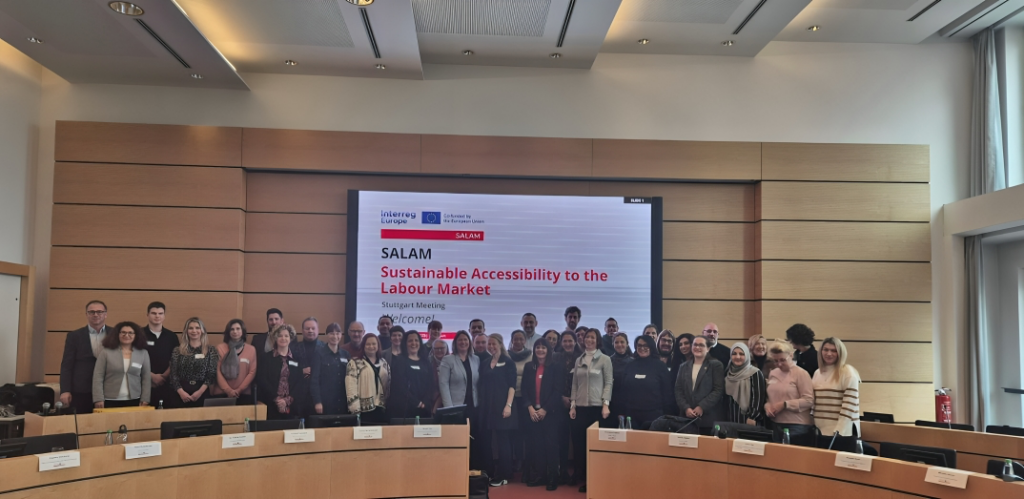SALAM Project Partners Meet in Stuttgart
27/01/2025

From 23 to 24 January, the SALAM project’s partners met in Stuttgart to discuss strategies for integrating migrants into the labour market. Tobias Diemer, Director at Volkshochschulverband Baden-Württemberg, opened the meeting by highlighting the potential of a diverse workforce with proper training. Representatives from the city of Stuttgart underscored their commitment to empowering migrants as members of society. Ayse Ozbacan, the City of Stuttgart’s Deputy of Unity Integration Policy, emphasized this commitment, stating that “everyone who lives in Stuttgart is from Stuttgart and everyone who lives here is welcomed.”
The meeting explored critical aspects of migrant integration. The Institut für Arbeitsmarkt und Berufsforschung (IAB) presented research revealing the challenges faced by refugees, including language barriers, lack of social networks, and trauma resulting from forced displacement. Kseniia Gatskova from the IAB highlighted the importance of accessible childcare facilities, particularly for single mothers, and explored “work first” versus “language first” integration approaches. While the former offers faster entry into the workforce, the latter may prove more sustainable in the long run.
The European Commission provided insights into its Pact on Migration and Asylum, a framework aimed at managing migration and asylum procedures. Ursula Hönich from the Directorate-General for Migration and Home Affairs emphasized the EU’s focus on clarifying refugee rights, strengthening support, and attracting skilled workers from outside the EU. She also highlighted the need to recognize the qualifications of refugees from Ukraine and facilitate their labour market integration.
The meeting showcased regional initiatives, such as the Tübinger Modell, a programme designed to accelerate the integration of refugees into the German labour market, and the SINGA initiative, which fosters entrepreneurship among immigrants. Participants discussed policy needs, knowledge transfer, and building networks to support migrant entrepreneurs. “Conversational lunches” were proposed as a format for facilitating dialogue among stakeholders.
The second day of the meeting, held at the Ministry of Education Baden-Württemberg, focused on educational and career guidance for immigrants. Participants learned about the Alliance for Lifelong Learning (ALLL), a key policy instrument with seven chapters dedicated to various aspects of lifelong learning.
The Educational and career guidance Network Baden-Württemberg (LN WBB) was also presented. This network of over 200 guidance offices aims to provide comprehensive support to immigrants from their first days of arrival.
A discussion with LN WBB partners highlighted the importance of collaboration and synergy among different organizations providing services to immigrants. The Jobcenter City of Stuttgart, for example, works closely with the Support Group Network to provide German classes and support to migrants.
Following two site visits, one to Kolping Bildungswerk to observe their training programme for childcare assistants and another to the Welcome Center Stuttgart, the meeting concluded with a plenary session. This session focused on the presentation of matching plans and provided an administrative update on the SALAM project.
The SALAM project aims to create a more inclusive and accessible labour market. The Stuttgart meeting served as a platform for advancing this goal, fostering an exchange of ideas and best practices among professionals working towards the successful integration of migrants.




